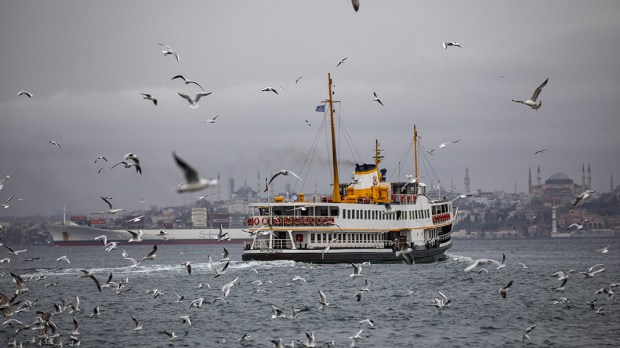Even under the best circumstances, working at sea is usually not an easy life. Seafarers tend to labor in a very isolated predicament – far removed from any oversight – and often suffer extremely harsh and hazardous working conditions. They also can encounter various forms of exploitation.
“In the maritime industry, we have a lot of violations and breaching of contracts,” says Fr. Bruno Ciceri. Workers might encounter delays in receiving their wages, or they might not get them altogether. They also can face abandonment at a distant port, which often happens for financial reasons, such as bankruptcy of the shipping company. These cases of abandonment have increased recently, due to the pandemic’s impact on the global economy.”
The year 2020 also saw a rise in incidences of piracy. Additionally, with so many countries now prohibiting foreign visitors, another widespread issue is refusal of shore leave (when the ship docks, the crew is not permitted to leave the ship).
“Not having the possibility to go ashore after weeks of navigation could be extremely stressful for the seafarers,” says Ciceri, who is well aware of their level of stress and isolation. After all, he serves as International Director of Stella Maris at the Holy See Dicastery for Promoting Integral Human Development.
A maritime ministry
Founded in Glasgow, Scotland, in 1920, Stella Maris (formerly referred to as “Apostleship of the Sea”) became known for providing hospitality and entertainment to sailors docked at various ports on the British Isles. The organization eventually expanded its operations and had 80 venues worldwide by the mid-1940s.
Ensuing decades, with rapidly advancing technology and globalization, saw immense changes in the maritime industries. Among the changes was the growing practice of procuring workers from developing nations who would be willing to work for comparatively low wages. Also, the ship crews of recent decades are often much more international, with four or five different nationalities of workers on the same ship.
Despite these shifts in maritime culture, Ciceri says, “the problems experienced by the seafarers in 1920 and the ones of the 21st century are still the same.”
And seafarers remain highly vulnerable to mistreatment. While international maritime labor laws exist, their enforcement can vary greatly from one location to another. As Ciceri remarks, “unscrupulous ship owners … know where to run their businesses without encountering problems.”
An already embattled way of life has met with further complication: Owing to the pandemic, many sailors and other seafarers cannot repatriate to their homeland or, for that matter, enter the land of any other nation.
Stranded at sea
Shortly before Christmas, Pope Francis commented on the plight of those stranded at sea (an estimated 400,000 persons worldwide) and called for governments to make every effort to repatriate them.
Ciceri’s rough estimate is that as many as 60-75% of the 400,000 stranded seafarers are Catholic. A huge number of them are from the Philippines, and a sizable number come from the southern regions of the Indian subcontinent. He also adds there are Ukrainian workers (who are typically Orthodox).
The overwhelming majority of seafarers worldwide are males from lower-to-middle-income countries (typically in Asia). Ciceri points out, though, that there is a significant portion of female workers (also from lower-to-middle-income countries) in the cruise ship sector. The passengers on these cruise ships have long since repatriated. As for the cruise ship workers, however, many thousands of them remain stranded at ports across the world.
Ciceri relates that, early on in the pandemic, there were “a number of suicides,” particularly on the cruise ships. At this point, he says, “we have a lot of anecdotal stories of seafarers feeling depressed and miserable, but most of them are coping.” He credits Stella Maris chaplains and volunteers with helping people cope under bleak conditions.
The work of Stella Maris
Some 230 chaplains and thousands of other volunteers serve Stella Maris, which assists sea workers at more than 300 ports in 41 countries. The pope has expressed gratitude to the organization in recent years for their continued and widespread assistance.
Aside from conducting Mass and distributing faith materials, Stella Maris provides donated clothing, cards for international phone calls and internet access, advice regarding issues with labor contracts, and assistance with medical costs. The organization also distributes face masks and hygiene products to the sea workers, seeing as how their employers are sometimes less than assertive in providing such items.
These days, Stella Maris is especially significant for some 400,000 stranded workers. And despite the appeals of Pope Francis and various international organizations, Ciceri does not expect that most of them will get to repatriate anytime soon.

